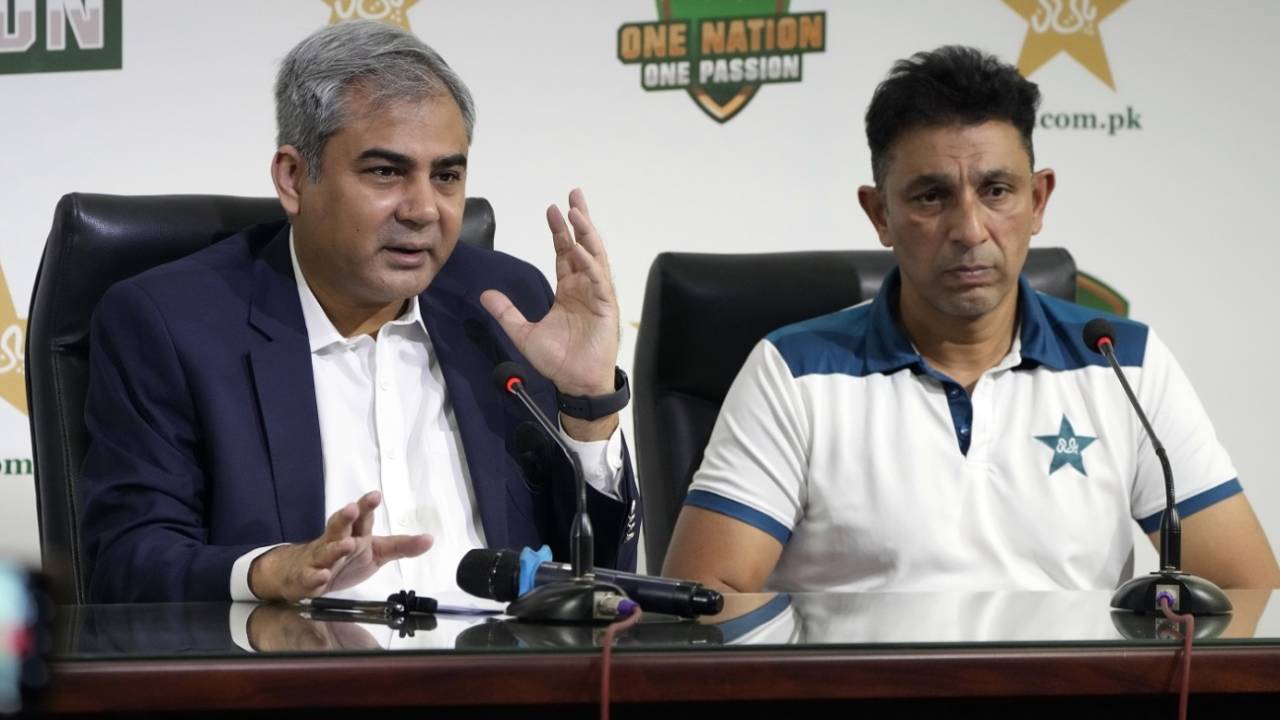PCB chairman Mohsin Naqvi has defended his decision to have Pakistan's players
train with the military during the last few days of Ramzan, rejecting the claim the camp had anything to do with several players pulling up with muscle injuries.
In the weeks that followed the squad's training camp at Kakul, Pakistan's most famous military training academy, Azam Khan, Mohammad Rizwan and Irfan Niazi all had their participation in the recently concluded home series against New Zealand curtailed. Azam was
ruled out with a calf injury before the start of the series, while Rizwan and Niazi were
sidelined with hamstring injuries after the third T20I.
Naqvi bemoaned Pakistan players' fitness as being "far behind" its peer nations. "Injuries never occur due to fitness training," he said at the press conference the PCB had organised to announce Pakistan's new head coaches. "People have got various theories around how to make players fit. Fitness has never been a focus of Pakistan managements in the past.
"I am not criticising anyone that came before me but look at players from the rest of the world. Pakistan players' fitness is well below that. This is just the start, we will have to ramp up player fitness even more. If I need to bring in fitness experts from around the world, I will."
Azhar Mahmood, who had coached Pakistan against New Zealand, and has now been appointed all-format assistant coach, said the injuries to those players took place while playing cricket. "Kakul training had nothing to do with cricket," he said. "The injury the players sustained happened [while] playing cricket, and the training had to do with physical fitness. If the players were injured, they wouldn't have played the first game. And Azam Khan was not injured before the series, he was injured in the nets."
This robust defence is in line with the PCB's keenness to maintain the army camp did not make a bad situation worse. When Rizwan, who retired hurt partway through his innings in the third T20I, and Niazi were ruled out of the New Zealand series, the PCB's official statement did not refer to any injury at all, instead saying the board had opted to "rest" the duo after viewing their radiology reports.
While it is true that intensive stress or training can lead to fatigue-related muscle injuries, the team management and the chairman appear to believe that fitter players are less likely to pick up such injuries, a view that is also in line with mainstream sports science.
The PCB has maintained that any niggles picked up are short-term, with unavailability limited to a few days rather than weeks or months. Pakistan are now scheduled to go to Ireland and England to play 7 T20I games, and announce a preliminary World Cup squad before 1 May.
The camp was the brainchild of Naqvi, who told the players during the PSL he organised it to get their fitness up to speed, and, in part, to help the players hit bigger sixes. "When I was watching the matches in Lahore, I don't think a single one of you hit a six that went into the stands," he had said. "Whenever a six like that was hit, I used to think a foreign player must have hit that. I have asked the board to make a plan that gets every player's fitness up to speed. You'll have to make a proper effort for that."
An intensive training regimen just a week after the PSL ended in the only window of what would otherwise have been rest did raise eyebrows. Naqvi acknowledged at the time there were very limited opportunities for such a camp, with Pakistan going into it on the back of six months of virtually non-stop cricket. Moreover, the camp coincided with the last phase of Ramzan, a time when most Pakistanis culturally tend to prioritise family or religious activities over work. Its effectiveness was made more challenging by the fact several of the squad players were fasting, with no food or water from sunrise to sunset, unconducive to a rigorous boot camp.
There is, though, precedent for Pakistan cricket getting the military involved with training. Misbah-ul-Haq's Pakistan famously organised a training camp with the military at Kakul academy before a Test series to England.
When Misbah scored a hundred in the first Test, he celebrated by doing ten push-ups, followed by a
military salute. The series was drawn 2-2, with Pakistan rising to the top of the Test rankings for the only time in their history.
